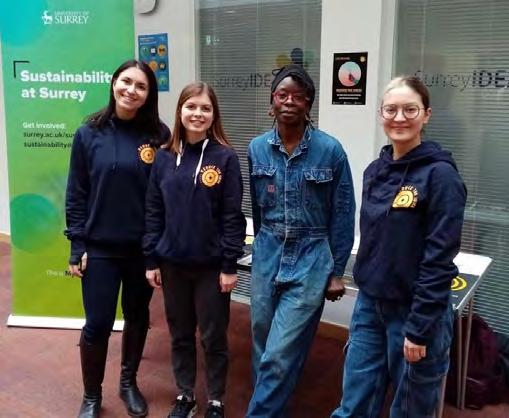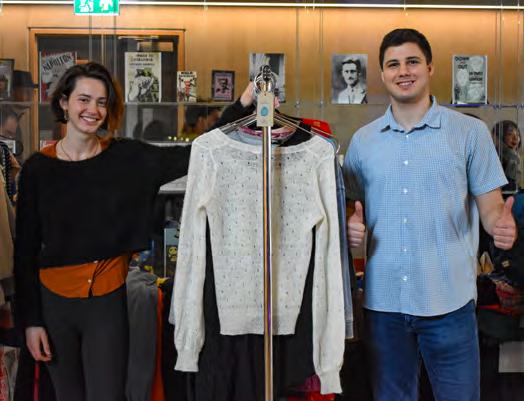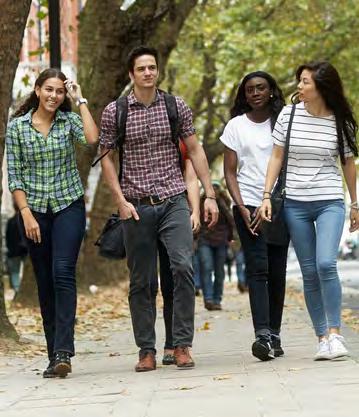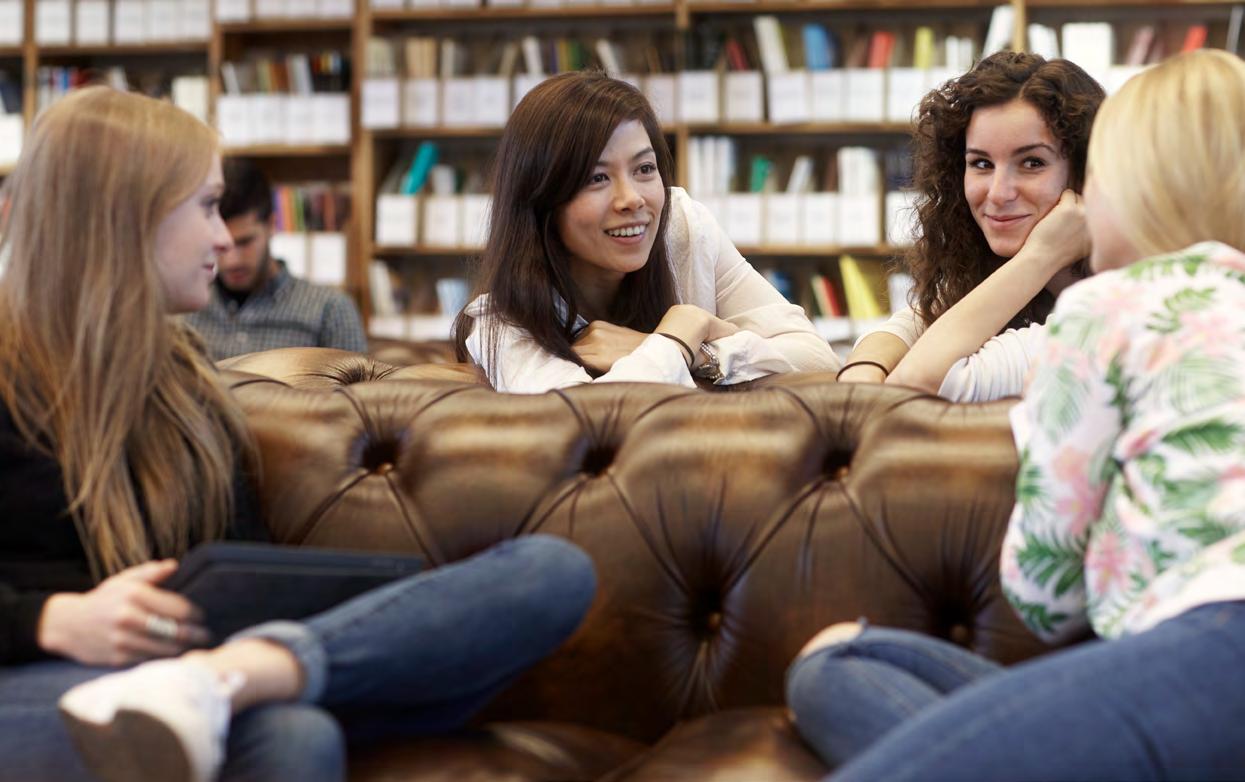
8 minute read
Reduce the Juice: Connect
Reduce the Juice is the engagement programme run by the University of London’s Sustainability Team. Our goal is to give students and staff the knowledge and skills to become sustainability advocates, building a community across London and the world so we can take action together and create a sustainable global future.
The 2019–20 academic year was a big year for Reduce the Juice as we undertook a transformation – but more on that later.
We continued our partnerships with London School of Economics and Political Science (LSE), University College London (UCL), and Goodenough College whilst also bringing the University of Surrey on board. The University of Surrey has a total of 12 Halls of Residences housing nearly 6,500 students, further expanding our ever-growing community. We welcomed the new academic year back in style in September 2019, attending fresher fairs here at the University of London and also at UCL, LSE and Goodenough College making a great start to an unforgettable year with Reduce the Juice.
The first challenge of the year was waste month at Surrey. Students were asked to carry out a single use plastic audit in their halls and pledge to reduce their single use plastic consumption. Manor Park came out on top and won £250 – with their winnings they hosted a vegan cake festival! Our second challenge focused on energy consumption. Whilst we did manage to visit the University and deliver our energy training sessions, sharing top energy conservations tips with students, unfortunately the challenge itself was cancelled due to the coronavirus pandemic, which saw the majority of students return home during the competition month.

LSE
Water was the name of the game for LSE’s first Reduce the Juice challenge of the year, with each hall battling it out to see who could reduce their water consumption by the most. The winner was Rosebury Hall who reduced their water consumption by a massive 16%! Just before the UK’s first lockdown, we managed to squeeze in LSE’s second challenge – the energy sprint. It was students from Butlers Wharf who reduced their energy consumption by 83,027 kwh which is enough electricity to power over 22 UK households for a whole year! During the pandemic we collaborated with LSE to create the Resilient Future zine! The project drew together the perspectives of LSE staff and students, as well at the University of London community, as we reflected on sustainability in the time of crisis. The zine can be read here.
Contents
Foreword by Charles Joly and Ellie Cottrell 3
Breaking with the Status Quo: what will it take? 5
Declassified Pandemic Survival Guide New systems for a better world Science Policy and Crises Environmental Engagement During a pandemic 6 8 9 10
Lockdown Reflections Recipe: Zero Waste Veggie Balls How to reduce your packaging waste Sustainability in Practice LSE’s Sustainability Research Podcast We Need a Blue New Deal Green Impact: staff-led sustainability at LSE 12 16 18 20 22 24 26
The Balance my eyes turn to the sky each day Inside back and back cover photography: Vera Vrijmoeth 29 30
The Resilient Futures Zine was created by Reduce the Juice from the University of London, in collaboration with Sustainable LSE. It was edited by Cat Acheson and designed by Antonia Bailey. Follow us on social media: @reducejuice @Reduce_Juice /@SustainableLSE @reduce.juice /@SustainableLondonSchoolofEconomicsE: sustainability@london.ac.uk
2 EDITOR’S MESSAGE
Welcome to the Resilient Futures zine! This project draws together the perspectives of LSE students, staff and others in the University of London community, as we reflect on sustainability in times of crisis. When the COVID-19 pandemic hit the UK and the rest of the world in the spring of 2020, reality as we knew it changed overnight. The Sustainable LSE and the Reduce the Juice teams had planned to spend the rest of the academic year working with students on the ground to encourage sustainable behaviour change at university, but we quickly realised that it would be impossible for us to come together in person. Instead, we decided to reach out to the university community, and to create a zine exploring how environmental engagement and climate action can still be carried out even in times of turmoil and physical separation. Whether it’s through questioning how the COVID-19 pandemic prepares us to tackle climate change, or through cooking, creating and finding new ways to connect in the sudden stillness of lockdown, sustainability provides us with a framework for navigating this crisis, and helps us look to the future for a better, more resilient world. We hope you enjoy this collection of think-pieces, creative writing, and sustainability stories. We’d like to say a huge thank you to all our contributors, and we hope to see you back on campus soon! Cat
UCL
We run Reduce the Juice a little differently at UCL, but that doesn’t mean it’s any less exciting. The new academic year saw the return of our ever popular swap shops, allowing students to bring in their old, unwanted clothes and exchange them for the preloved clothes other students have donated.
To draw attention to the huge impact our modern food system has on the environment, we hosted a sustainable food event at the UCL Student Centre. The event highlighted the carbon impact of a range of diets, from a heavy meat eater to a committed vegan, and gave students suggestion on how they could take a step to reduce the impact of their diet. Before the pandemic hit, we were working with the team at UCL to develop a collection scheme for the end of the year. The intention was to collect unwanted bedding and kitchen utensils from students as they moved out of halls. We were then going clean and redistribute the items to incoming students the following year, to prevent waste and increase access to education by reducing the cost of moving to University. Unfortunately, the pandemic put a halt to this project. We hope to continue this work once student numbers return after the pandemic.

Foreword by Charles Joly and Ellie Cottrell
Thank you to all our contributors, Cat, and Antonia for making this beautiful sustainability themed Zine a reality. What struck me most about the Zine, is the sheer diversity of people and perspectives it brought together. Turning the clock back to my student days, climate change was taught in my environmental course but was never a mainstream topic. Over my career I have witnessed a monumental rise in awareness. The ‘sustainability community’ is broad and diverse: from sustainability professionals to eco-activists, from obsessive home recyclers to flexitarians, and many more. We are all joined by a simple idea: that our planet needs some TLC. And more and more people are hearing us and joining in. Whether you are an artist or a scientist, a student or a professional, young or old, no matter what course you study or career you chose: you can be a force for change for the planet. Now more than ever is the time to spread a message of hope for a sustainable and resilient future! Charles Joly, Head of Sustainability at LSE
Thank you to all the contributors and the editors, Cat and Antonia, for putting this Zine together! Having students and staff come together during a time of hardship, bringing their own creative outlets and inspirational sustainability stories to create such an engaging collection of work, is inspiring and refreshing. In a time where activists are calling for change in a post-pandemic world, this zine on sustainability is pertinent more than ever at this critical fork in the road, between following the status quo or redefining a green new outlook. The question of what needs to be done is one shared by those eco-minded, and manifests in many ways, as seen in the work in this zine, such as artistic expression through photography and poetry, to informative pieces on reducing plastic consumption and the need for a Blue New Deal. Seeing not only a diversity of people represented in this zine but also a diversity of thinking and expression is truly humbling, and I am excited for the year ahead to be working with such passionate individuals to hopefully foster and further these visions of sustainability at LSE. Ellie Cottrell, Environment and Ethics Officer LSESU 2020-2021
3
When the pandemic hit we knew we had to find a way to keep our community connected, but we also saw it as an opportunity to evolve Reduce the Juice into a more dynamic platform that continued its behaviour change initiatives. But in response to student feedback on the project, we also wanted Reduce the Juice to help educate its community on the bigger systemic issues our earth is facing – and this is exactly what we did. In a few short months Reduce the Juice: Connect was created and our first webinar, ‘An Introduction to the Climate Crisis’, was advertised to all of our existing Reduce the Juice: Connect members and for the first time, University of London staff. Thus began the start of our monthly webinars focusing on a new sustainability issue each month, members are then invited to take part in a sustainability challenge to showcase how they’ve put their knowledge into practise. We have a different and exciting sustainable prize each month! Plus, if you take part in at least three webinars and three challenges, you’ll receive a Sustainability Advocate Award from the University of London that you can include in CV’s and job applications. If you would like to be a sustainability advocate or just keep up with what we’re up to, take a look at the program, we’d love you to join us!










